|
This article focuses on Dutch homicide cases involving victim burial in a clandestine grave. There is a lack of adequate criminological research about the nature of this kind of homicide. The results indicate that there are differences between the ‘regular’ homicide cases and clandestine burial cases. For example, clandestine burial cases included a higher proportion of sexual homicides. Second, different types of burial cases were analysed through cluster analysis, based on victim, offender and crime characteristics. Three distinct types of burial cases were defined which differ substantially with respect to the gender of the victim, where the burial took place and the relationship between victim and offender. |


PROCES
Meer op het gebied van Criminologie en veiligheid
Over dit tijdschriftMeld u zich hier aan voor de attendering op dit tijdschrift zodat u direct een mail ontvangt als er een nieuw digitaal nummer is verschenen en u de artikelen online kunt lezen.
| Redactioneel |
Over verbaliseren en sfeer creëren |
| Auteurs | Mr. dr. Maartje van der Woude |
| Auteursinformatie |
| Artikel |
Moord en doodslag gevolgd door een clandestiene begraving van het slachtoffer |
| Trefwoorden | Clandestiene graven, Moord, Profileren, Typologie |
| Auteurs | Romano Buijt MSc, Chris Pellemans MSc en Dr. Johan van Wilsem |
| SamenvattingAuteursinformatie |
| Artikel |
De officier van justitie als kampvechter |
| Trefwoorden | Openbaar Ministerie, Slachtoffer, Communicatie, heldere taal |
| Auteurs | Prof. dr. Henk Elffers |
| SamenvattingAuteursinformatie |
|
The public prosecutor should act as the knight fighting in court for a victim. A much more communicative strategy instead of one aiming at a juridical discourse will reframe what is happening in court and make it understandable for victims and public in general, Examples are given of how to do so. A discussion on the effects of such a strategy is presented. |
| Praktijk |
La Esperanza |
| Auteurs | Anne Thijssen LL.M, BA |
| Auteursinformatie |
| Artikel |
Over een verdrinkend kalf en groener grasEen beschouwing van de Nederlandse en Belgische gedragskundige rapportage in strafzaken |
| Trefwoorden | gedragskundige rapportage strafrecht, rapportage pro justitia, psychiatrische expertise |
| Auteurs | Mr. Merijne Groeneweg |
| SamenvattingAuteursinformatie |
|
During the Belgian criminal trial on Kim de Gelder, Belgian forensic psychiatry was criticized. Forensic psychiatrists seemed to be longing for the Dutch practice. Was this justified? In this article, the psychological and psychiatric report in criminal cases in the Netherlands and Belgium are compared. Subjects of criticism are analyzed. Important differences exist regarding to the competency assessment the experts, their research possibilities, the (legal) requirements to the psychological and psychiatric report and the concept of ‘toerekeningsvatbaarheid’. New Belgian legislation can be a basis for improvement. Taking the differences into account, the Dutch practice could service on improving certain criticized aspects. |
| Artikel |
Recht doen aan alternatieve scenario’s |
| Trefwoorden | alternatieve scenario’s, Geloofwaardigheid, Aannemelijkheid |
| Auteurs | Drs. Berber Lettinga |
| SamenvattingAuteursinformatie |
|
This article presents how criminal court handle with stories alternative to the accusative story. By analysing verdicts it is showed that reasonable doubt is not merely caused by the simple possibility of an alternative scenario. Under condition of sufficient evidence for conviction criminal courts will reject alternative stories which are without likely indications as well as unusual stories presented in an tardy stadium of law. Therefor it is important for participants in law to focus on the (lack of) support and the (im)plausiblity of alternative stories, instead of (requesting) infinite search for discriminative evidence in merely suggested stories. |
| Column |
De bierkaai van SGLVG |
| Auteurs | Mr. Ad de Beer |
| Auteursinformatie |
| Diversen |
PROCES Chronologisch register 2014 |
| Diversen |
PROCES Auteursregister 2014 |
